

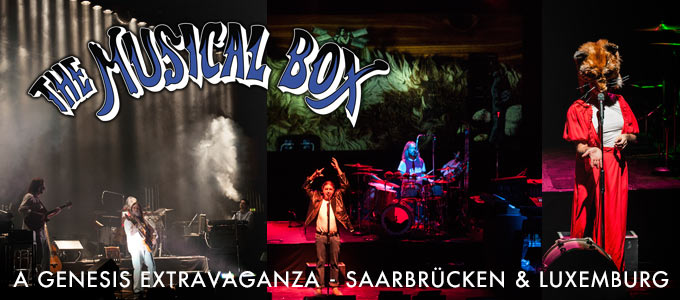
This is really not a concert report but a very subtle assessment of why I find the current production by The Musical Box simply outstanding. I have attended their shows since 2004. Personal highlights were the Selling show in Saarbrücken (GER) in 2007 and the Foxtrot show in Mainz (GER) I got to see spontaneously. The Nursery Cryme Event in Duisburg (GER) was a special case because it was a fanclub event; the current production has a bit of that flavor in the third act. The Saarbrücken show of the current tour was overwhelming for me. I have heard mixed reports about the current setlist, so I have decided not to write another “normal” concert report but to focus on the dramaturgy of the set. Perhaps this can help people extricate themselves from the given structures of a Genesis set list. I set out to put the Saarbrücken and the Luxembourg shows in one analysis, but since the Luxembourg show was different the first part of this article will be a “normal” report about Saarbrücken before I examine the changes in Luxembourg.
Saarbrücken
When you enter the venue you notice a normal stage with a pedestal. The stage design borrows from the old Genesis stages. There is a percussion set and an extra keyboard stage left (from the audience's point of view), and several mike stands at the top end of the stage. Before I begin my analysis let me say this: I, too, had hoped for a 'normal' set list, for this three-act story sounded a bit weird at first. Basically, it is a mixture of the various shows The Musical Box have done, but it consists mainly of songs The Musical Box have played rarely or never (except for act 2, that is). A purely “obscure” set list would have been great (say, Stagnation, Visions of Angels etc.), but from a dramaturgical point of view they could not have done a better job. Each part builds on the previous bit. At the same time, the structure reminds me of what TMB's Canadian colleagues from Rush have done: For their 40 tour a couple of years ago, they did not only work backwards through time and had a simplified stage. The Musical Box do not do as strictly as Rush, but everybody who has seen a Musical Box concert this year will know what I'm getting at. I only realized all this during the show, but let's begin in the beginning:
Act 1 - The Wind's Tail
Unquiet Slumbers For The Sleepers … What a great idea to use this as pre-show music. The house lights go out during the song and the band come on. I love it when I know the lights will go out after the next song. With Phil Collins it is Souareba, with Metallica it's AC/DC's It's A Long Way To The Top, with Iron Maiden Doctor Doctor … you prepare yourself mentally and tell yourself “here we go”. The drum roll comes from the new (and very good!) drummer and then it's “Beam me up, Scotty!” On the screen Phil Collins is quoted: “I think people underestimated our contribution”, and you can interpret that in two ways. One: When Peter left, many people thought he had done everything and Genesis was just a backing band. Two: Throughout the years I have had this feeling that Genesis (despite their later successful hits) did not receive the appreciation they deserved. This is not restricted to Phil Collins but to all members of the band, which makes it a kind of praise.
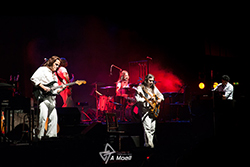 …In That Quiet Earth: I am dumbstruck, for Wind And Wuthering is one of my favourite Genesis albums, and I have never heard anything from it played live by Genesis besides Afterglow. Plus, I have rediscovered the record only recently. I particularly enjoy the instrumental bits. As I look around I wonder “who is the guy on bass?” and realize “it's Denis Gagné” … an unaccustomed sight, but, boy, does he play well. He will switch to the percussion set for Act two.
…In That Quiet Earth: I am dumbstruck, for Wind And Wuthering is one of my favourite Genesis albums, and I have never heard anything from it played live by Genesis besides Afterglow. Plus, I have rediscovered the record only recently. I particularly enjoy the instrumental bits. As I look around I wonder “who is the guy on bass?” and realize “it's Denis Gagné” … an unaccustomed sight, but, boy, does he play well. He will switch to the percussion set for Act two.
Robbery, Assault And Battery / Wot Gorilla: The overture is prolonged by this double. I love it when a concert begins with an instrumental. The transition to Robbery is great; the songs have similar speed, and there is a cool groove in the few bars where there is just drums and bass. But Genesis never had that bit, so it is a brief moment of revelation. The instrumental parts of Robbery are fused into one, and then the drummer proceeds to smash the beat of Wot Gorilla in your face. Youtube has a video of the original medley; I prefer the change with the gorilla – it hammers non-stop from In That Quiet Earth to the end. The song is accompanied by visuals that draw from the covers of Wind And Wuthering and A Trick Of The Tail.
Blood On The Rooftops: Denis comes to the front and sings (he will continue to sing from the keyboards from the middle of the song). I like how they have dropped most of the theatre antics. Denis is more free in his performance, and the band, too, do not have to stick to the details as carefully. Denis' role changes throughout the three acts, and that is one of the reasons I love this setlist (and one of the reasons for the three-act model), but I felt there is more Denis Gagné in this show than ever. Blood On The Rooftops was a very positive surprise; Gagné has always been more appreciated for doing the Gabriel songs, but he sings this song supremely well. Francois (“Steve Hackett”) has his moment in the new show when he plays the intro wonderfully on the acoustic guitar; I have heard Steve Hackett hurry through it much worse.
Dance On A Volcano: After a brief welcome the show continues with A Trick Of The Tail. Having also attended The Musical Box's Trick tour, I must say this year's versions are superior. Which brings me to what I really enjoy about the show… Gagné remains Gagné, and his vocals have moved me more than they used to. He did not act, but sang the songs. Even though the phrases were very much the same there was much more emotion in his singing.
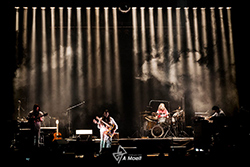 Los Endos: The final song of the Trick album was the closing song of Act One. And I disagree with other fans: Los Endos must be placed here. Why? Simple: If The Musical Box played a “normal” show with Los Endos as the closer of the set or the encore, it would have been classic or orthodox or the way Genesis would have done it, but it would have been exceedingly boring for me. This was the song is subordinated to the overall concept of the show. I frequently find myself wishing that bands break up such structures and shuffle songs around. It would give them so many interesting opportunities to re-structure their set lists. I notice parallels to Rush who keep moving their classic songs to other positions in the set. I wondered about the missing laser, because I remember seeing it in a video of an English show of the tour. I have found out since that the laser was broken. Perhaps it would not have fit in this place in the set, but I would have enjoyed it – even though it would have been too early in the set at the end of Act one.
Los Endos: The final song of the Trick album was the closing song of Act One. And I disagree with other fans: Los Endos must be placed here. Why? Simple: If The Musical Box played a “normal” show with Los Endos as the closer of the set or the encore, it would have been classic or orthodox or the way Genesis would have done it, but it would have been exceedingly boring for me. This was the song is subordinated to the overall concept of the show. I frequently find myself wishing that bands break up such structures and shuffle songs around. It would give them so many interesting opportunities to re-structure their set lists. I notice parallels to Rush who keep moving their classic songs to other positions in the set. I wondered about the missing laser, because I remember seeing it in a video of an English show of the tour. I have found out since that the laser was broken. Perhaps it would not have fit in this place in the set, but I would have enjoyed it – even though it would have been too early in the set at the end of Act one.
Act 2 - Broadway Melodies:
The Lamb Lies Down On Broadway: The familiar intro to The Lamb Lies Down On Broadway follows after a brief video intermezzo. I had last seen the Lamb show in 2006, which made it ten years since I have seen that set, and Genesis 2007 has not been much later. This part had something fresh. The Lamb began strongly, as usual, and Denis reverted to his Rael look, though he did do it as strictly as in the Lamb shows. For example, he did not wear the wig. The slides that were not used back then added another refreshing element.
Fly On A Windshield / Broadway Melody Of 1974: Good to have this combo as well. The instrumental part is strong, and you can really see yourself in the streets of New York City.
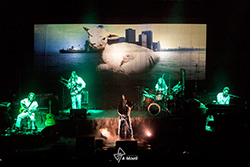 In The Cage: This is where the set breaks away from the album. That's fine, though, it is meant to fit the overall concept of the show. Denis has decided not to perform In The Cage bare-chested anymore; we all get older … but this performance felt more emotional than the faithful reproduction of 1975. It reminded me more of Phil. This whole Lamb block felt a bit like Phil putting on the leather jacket briefly for In The Cage in 1983/4, to allude to Rael but not to play Rael. It really felt like that, and it gave Act two more authenticity than I thought it would have.
In The Cage: This is where the set breaks away from the album. That's fine, though, it is meant to fit the overall concept of the show. Denis has decided not to perform In The Cage bare-chested anymore; we all get older … but this performance felt more emotional than the faithful reproduction of 1975. It reminded me more of Phil. This whole Lamb block felt a bit like Phil putting on the leather jacket briefly for In The Cage in 1983/4, to allude to Rael but not to play Rael. It really felt like that, and it gave Act two more authenticity than I thought it would have.
Back In N.Y.C.: I'd almost forgotten this favourite of mine was in the set, too. I've always like this great confused song. It was played and sung very well with lots of expression by Denis. His way of singing was a bit like the version of Archive 1967-1975, where Peter had recorded much of the vocals for The Lamb again. I may be wrong, but some parts came across much wilder, much tougher, and then these long bits "from the waaaaay that I feeeeeaaaaaaal" … out-effing-standing!
Hairless Heart / Counting Out Time: This combination is also played traditionally in one go. Hairless Heart is one of the songs that could have been on pre-Lamb records (and another opportunity for “Steve” to shine), were it not for a certain twist that makes it sound more “American”. The visuals that accompany the song point at the number to follow. Counting Out Time stands in the tradition of humorous songs and has the necessary erotic visuals. Those must have been quite shocking in the America of 1975.
Carpet Crawlers: Denis sang some passages lower than Gabriel in the chorus. The key apparently makes this song difficult to sing. This was one of the few classic songs of the evening, right before the interval. The classics provide a certain stability in the set; their careful and sparing use is a reason this show seems so fresh.
The Lamb part is probably the most “normal” part of the evening because it does not differ much from the '75 show apart from a couple of new slides and the less theatrical performance. It also delays the “main act” of the evening, and this culmination is so important. Sure, all the songs could have been played in any old order, but as it is the third act has a special position: You can only have this effect if you have played the other songs first. Act one was great – it points forward to Act three and its less frequently played songs. Not playing Afterglow but still playing Dance On A Volcano and Los Endos is the key. Then there is a steady part with the superbly played Lamb songs and a much higher percentage of the usual suspects. Going for obscure numbers such as The Lamia, The Colony Of Slipperman and others would have been too much, but Act two gives you a couple of classic songs, ending with one of the ultimate classics, The Carpet Crawlers.
The stage is altered during the interval, and the screens show drawings of old instruments – a nostalgic moment for the fans (unless they are at the beer stand or the loo, of course). What's playing on the house PA? Exactly: Mike Oldfield's Tubular Bells, as Genesis did on their Selling tour in the early 70s and as The Musical Box themselves did as they played this show. All this indicates: We are moving into pre-Lamb times; this is the part that makes this show really special. Let me say this up front: Had I not known the set list beforehand it would have been almost too much for me. It was my first The Musical Box concert in 2004 that brought me closer to those old albums (though I already owned them). It was The Musical Box that gave me an access to the music and the lyrics, particularly of The Lamb. I knew the “usual classics”, but now the ignored other songs finally get the opportunity to shine, and this show was a Who Is Who of those songs. The visuals are cut down to a minimum now; the lights take over from the screen and we are close to my favourite period of the Gabriel era, the time before the masks, the period of early 1972.
Act 3 - Before The Ordeal
A Place To Call My Own: Who would have thought they would ever hear a song from the Genesis debut album live? Not me! From Genesis To Revelation has a couple of treasures, and the songs are not as bad as they are usually made out to be. The last song of the album is one of those gems. The Musical Box drop the orchestral finale and segue straight into the first complete song of Act three.
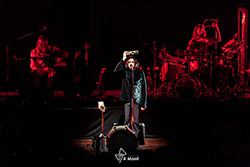 Time Table: Hidden on all those über-songs on the Foxtrot album, between Watcher Of The Skies and Supper's Ready, this little ballad has never had an opportunity to shine. I wonder why, because these songs balance the album, and they would have worked live very well. These songs have the obscure lyrics and they show that Genesis could write catchy tunes even then. Denis Gagné comes into his own here. Though he does not wear the wig and costumes to represent young Gabriel (admittedly, Gagné's outfit might well be vintage) I finally get the feeling again that this is young Gabriel standing before me. During the recent show I have rather had the impression of “Gagné plays Gabriel”. Occasional liberties in performance and vocals enhance the illusion better than perfect but sterile imitation. Sebastien Lamothe plays the normal Rickenbaker bass for the first time on Time Table. The bass guitar is much more important for the melody than I thought. I have never realized that, never noticed the wonderful accentuation before.
Time Table: Hidden on all those über-songs on the Foxtrot album, between Watcher Of The Skies and Supper's Ready, this little ballad has never had an opportunity to shine. I wonder why, because these songs balance the album, and they would have worked live very well. These songs have the obscure lyrics and they show that Genesis could write catchy tunes even then. Denis Gagné comes into his own here. Though he does not wear the wig and costumes to represent young Gabriel (admittedly, Gagné's outfit might well be vintage) I finally get the feeling again that this is young Gabriel standing before me. During the recent show I have rather had the impression of “Gagné plays Gabriel”. Occasional liberties in performance and vocals enhance the illusion better than perfect but sterile imitation. Sebastien Lamothe plays the normal Rickenbaker bass for the first time on Time Table. The bass guitar is much more important for the melody than I thought. I have never realized that, never noticed the wonderful accentuation before.
Seven Stones: And then there is the secret highlight from my favourite Gabriel-era record. The Musical Box played the song in Duisburg in 2007, and I cannot get enough of it. I have so many pictures of so many great times in my head when I hear this song that I do not really pay attention to the lyrics, good as they may be. This mellotron! I could soak in it as in a wonderful hot bath. They way Denis tackles the high passages is incredibly impressive!
Can-Utility And The Coastliners: The second hidden gem from Foxtrot follows as a chaser. After a brief comment on the way the title developed those twelve-string guitars come in. The Foxtrot cover comes alive before my mind's eye and I feel as if I was standing by the sea-side. Genesis allegedly found the song “too fragmented”. Perhaps, but those fragments fit really well. Denis said this was one of the favourites of The Musical Box, and their performance showed.
Looking For Someone: The previous twenty minutes had been a rollercoaster ride, but now we get to the hot stuff. This is –the- song of the evening, -the- rediscovery. I wonder once more why Genesis and Gabriel have never given this song another chance. Yes, there is the BBC live version from 1970, but that's it. In later tours the band favoured The Knife. I never imagines Looking For Someone could have such a punch live – the finale had a strobe-light effect much as The Knife and Hogweed. The Musical Box slam this jewel into people's ears with remarkable power. Sebastien played a bass guitat that looked like a guitar of Angus Young's. The song sticks out because it demands other instruments. Francois, too, had to switch from thinking “Hackett” to “Phillips” (and I was too astonished at the version and my seat in the centre to check whether he, too, had a different guitar). The drummer had to switch from “Collins mode” to “Mayhew mode”, too.
After The Ordeal: As if all that were not enough the band also play this instrumental from Selling. Tony hates the song to this day; I have no idea why. Denis leaves the microphone to play cello. That's what I like about this show: Denis is not just a Gabriel clone, but he participates in the music, too. Sebastien wins the prize for “fastest change of a guitar”: He needs an acoustic guitar for the first two notes, and this guitar is immediately replaced with another by a roadie. The screen comes on again and shows images of Genesis from 1969 to 1977 in roughly chronological order; it is a bow to a great band and an emotional moment for the fans, and it lets the little light of After The Ordeal shine even brighter.
The Cinema Show: Towards the end of the main set there is another classic. When I first saw the set list I would have loved to replace this song with something unusual, but the version is great. Reducing the visuals (apart from the mirrorball) focuses attention on the music. During the instrumental part there are only a few lights on, so you get to really watch the band make the music. This is also the moment to pay a huge compliment to the new drummer. He is not Martin Levac – nobody is – but he has a lot of fun up there and the right style to cover the songs instead of replicating them.
Aisle Of Plenty: This is why The Cinema Show HAD to be the closing piece. Never did I think I would be so overwhelmed by the brief epilogue to Selling. The way Denis, the keyboarder and Sebastien share the vocals, the intensity with which Denis sings it … and when you think that that was it the album cover appears on the screen, comes to life and fades slowly before the song also fades in the dark and a single mellotron chord finishes the show … very moving!
While the audience demand an encore the credits of the show are playing. You usually show those at the very end but it makes good sense showing them now (why? I'll be coming to that). After the thanks to everybody there is a "Thank You Tony Banks Mike Rutherford Phil Collins Peter Gabriel Steve Hackett For Changing Many Peoples' Lives". Accompanied by a photo from the Lamb era, and that's the message of the night.
Entangled: The band return to play one song each from the Collins and Gabriel eras. Entangled was played on the Trick tour, but after the tour de force that is Act three it is a good choice to calm down your nerves. A great animation with the nurse who also presents the bill completes the performance. Denis does a very good job with this song. He still wears the outfit from Act three that resembles Peter Gabriel before the masks, which makes it look as if Peter was singing Entangled. The effect is not disturbing at all; not only does it show Denis can pull off songs from both eras but it also joins the Gabriel and the Collins era in this one song, as it were.
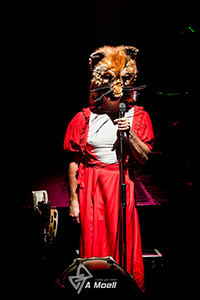 The Musical Box: The last song is the signature song, the one the band took their name from. There is no story to go with it; in fact there have been none throughout the evening. That is good because Denis has stuck too close to some stories at times, but reproducing the tours is, of course, something completely different. The band play the rougher version of 1972. The lights follow the colour concept of the Selling tour. For the finale they bring on the original costume for the song, the fox's head and the red dress. The closing section is sung normally, without the Old Man outfit, strong and lively. This is the only theatrical moment in the show. The closing section resembles Bataclan '73 (which had the fox outfit, too). After that the lights go out, the show is over. The fox leaves the stage he had entered two and a half hours before as a bass player. Thank you, The Musical Box!
The Musical Box: The last song is the signature song, the one the band took their name from. There is no story to go with it; in fact there have been none throughout the evening. That is good because Denis has stuck too close to some stories at times, but reproducing the tours is, of course, something completely different. The band play the rougher version of 1972. The lights follow the colour concept of the Selling tour. For the finale they bring on the original costume for the song, the fox's head and the red dress. The closing section is sung normally, without the Old Man outfit, strong and lively. This is the only theatrical moment in the show. The closing section resembles Bataclan '73 (which had the fox outfit, too). After that the lights go out, the show is over. The fox leaves the stage he had entered two and a half hours before as a bass player. Thank you, The Musical Box!
Luxembourg
But boy that wasn't all, for there was the show in Luxembourg, too, which had some noteworthy changes, not just in the set but in the overall show. But first things first:
At the Rockhal Club (which is not the big venue but the small club next to it) I installed myself in the first row. This is the first Musical Box concert where I'll be standing. A much more relaxed atmosphere that inspires the audience to sing along and let their hair down.
The stage was much more Spartan than at the Saarbrücken concert; there were neither a platform nor a mirrorball.
Chatting with other fans brought me up to date with the gossip. In the interval I heard that Denis was not feeling well that night, but you would not have noticed – and whether that prompted the change in the setlist is anyone's guess. He sang really intensely in the Lamb part. The crew had arrived only at 3 in the afternoon, and the lighting engineer had done a lightning job to reprogramme the Musical Box lightshow for the house lights – it was that spartan!
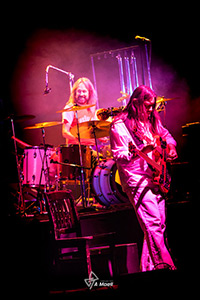 The lights went out soon after eight o'clock and the band took the stage. First surprise: NO SCREEN, hence no Unquiet Slumbers for starters. The drummer began with the introduction to …In That Quiet Earth and off they went. The screens were not really missed, though, for the night turned into a kind of “The Musical Box perform Genesis music on a stage in the style of a Genesis stage in 1972”; actually much like Act three would be like at most shows. The music in the first two acts appeared to be less polished. The sound topped it all, though. I have not heard such a flipping great sound at a Musical Box show in a very long time. In Saarbrucken they had to even out a few wobbles in the beginning, but here they went all out from the word go – particularly the mellotron in Blood On The Rooftops, wow! Denis greeted everybody in French before they continued with Act one.
The lights went out soon after eight o'clock and the band took the stage. First surprise: NO SCREEN, hence no Unquiet Slumbers for starters. The drummer began with the introduction to …In That Quiet Earth and off they went. The screens were not really missed, though, for the night turned into a kind of “The Musical Box perform Genesis music on a stage in the style of a Genesis stage in 1972”; actually much like Act three would be like at most shows. The music in the first two acts appeared to be less polished. The sound topped it all, though. I have not heard such a flipping great sound at a Musical Box show in a very long time. In Saarbrucken they had to even out a few wobbles in the beginning, but here they went all out from the word go – particularly the mellotron in Blood On The Rooftops, wow! Denis greeted everybody in French before they continued with Act one.
The trick songs gained from this sound. Hilarious the mistake of „Mike“ Sebastien Lamothe when he messed up the Dance On A Volcano intro before the drums come in – he drew a very expressive face and played on. Los Endos has rarely sounded so wild; when the Squonk reprise began I could only hope there were no people with wigs in the audience because the sound would have blown their hairpieces away. A roadie played the percussions. Since they had not videos the next part continued without a longer break.
Act two, The Lamb, was my personal highlight. In Saarbrücken it was great to hear the songs again, but Luxembourg showed how much power these songs have if you leave out all the slides. All it took was some subtle lighting. The band were on fire and blasted out Act two with the power of Genesis in 1972. This mixture of the 1975 songs and the minimalistic setup of earlier shows bowled me over – not just the visuals but the strength of the band. Denis played Rael as a punk, and since punk is minimalistic itself the lack of slides fit the performance. In Saarbrücken I felt as if I were walking the streets of New York, but in Luxembourg I felt like a punk myself. The drummer kind of lost it during In The Cage; he really drove the band through the song, and the keyboarder had a good laugh.
Back In N.Y.C. was equally intense. Denis would hold the microphone out to Sebastien to let him sing the repeated “no” after “no time for romantic escape”; this time he had him sing the whole line, including the laughter. Hairless Heart and Counting Out Time seem much better without the accompanying slides. The audience in front of the stage used Carpet Crawlers to sing along … it was a wow moment for him when Denis realized that… it turned the whole show from The Musical Box playing and everybody else listening into a celebration of Genesis in which everybody participated. I don't know about the licensing concept (or, in fact, whether you need to apply for a license if you only want to perform the music), but I would love to see The Lamb performed on this stage. You have no idea what is in this music if you leave out the visuals! I needed the interval, for I was overwhelmed.
The interval had no Tubular Bells and no instrument animations.
Act three continued in the same vein. Instead of sitting on the platform Denis stood at the front mike for A Place To Call My Own. The other songs were real highlights; it is wonderful that they finally are given the space they deserve. Only Can-Utility And The Coastliners was dropped so they went from Seven Stones straight into Looking For Someone. After that Denis briefly left the stage and the keyboarder embarked on Firth Of Fifth. I was not all surprised, for we could hear it at the soundcheck. The keyboarder hit a wrong note in the beginning, but little flaws like that make the show all the more human. Denis played the percussion during the guitar solo (instead of leaving the stage as in the Selling show). Francois gained another solo this way, but I regret they dropped Can-Utility And The Coastliners for it – that is a song that ought to stay in the set. My guess would have been for them to drop After The Ordeal as they had not visuals in Luxembourg. I hope they will avoid the mistake of putting too many songs from the Selling tour into their set, as the set is much better without those. Still, it was nice to have a change from Saarbrücken this way. Denis said something in French after Firth Of Fifth and before they played After The Ordeal. Denis played keyboards and the flute instead of the cello. After that they went straight into The Cinema Show. The visuals for this were very simple: not even a mirrorball, but the whole band were lit in blue. Aisle Of Plenty was a great closer for the main set.
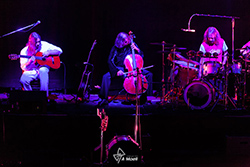 Despite his strong performance we could hear that, from around Firth Of Fifth, Denis was pushing the limits of what he could do with his voice and a sore throat. My suspicion that they would drop Entangled proved true. But then they exchanged thirteen minutes of Can-Utility and Entangled against ten minutes of Firth Of Fifth, so that was not a big deal. Kudos to Denis, though, for pulling it off. The Musical Box was the song that brought the show to an impressive end. When Denis dressed up as a fox again and sings the “now now now” part there was no individual light to support the vocals, but the lighting changed for the whole stage. The “old man” and the “fox” masks are, in a way, precursors of the Mama performance years later, when Phil Collins's face would be lit ghostly from below during The Laugh.
Despite his strong performance we could hear that, from around Firth Of Fifth, Denis was pushing the limits of what he could do with his voice and a sore throat. My suspicion that they would drop Entangled proved true. But then they exchanged thirteen minutes of Can-Utility and Entangled against ten minutes of Firth Of Fifth, so that was not a big deal. Kudos to Denis, though, for pulling it off. The Musical Box was the song that brought the show to an impressive end. When Denis dressed up as a fox again and sings the “now now now” part there was no individual light to support the vocals, but the lighting changed for the whole stage. The “old man” and the “fox” masks are, in a way, precursors of the Mama performance years later, when Phil Collins's face would be lit ghostly from below during The Laugh.
And then this show was over, too.
I had to take a deep breath and get to terms with this show. I had the next day off, so I took my time and only left when the security asked us to. What remains? Two different shows, one change in set lists. Though I initially preferred Luxembourg I could not say today which of the shows was better. Luxembourg had the superior sound. Saarbrucken had the better set with Can-Utility and Entangled. The raw performance, particularly of The Lamb, in Luxembourg was special. The whole show was, visually, all like Act three and showed The Musical Box more like Genesis, i.e. the illusion was stronger and even the small flaws gave the impression that that was Genesis (for their stage shows did not run smoothly in those days). It was an evening where The Musical Box became Genesis and showed, as it were, in 1972 what they would be doing during the following five years. And what do I say to the guy right behind me who yelled “No Supper's Ready?” right after the show? I tell him: No, this show is for the dyed-in-the-wool fans, and that's how it should be!
Thank you, The Musical Box, for two great evenings. That was awesome! I don't know if I will be able to see them again in 2019, but The Musical Box have reached new heights with this show.
By Daniel Mueller, English by Martin Klinkhardt
Photos by Alexander Moell (Konzerfotografie Moell)
The Musical Box - A Genesis Extravaganza - tour dates

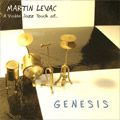

Brand new album by Martin Levac. Contains eleven Genesis-classics in Jazz style.